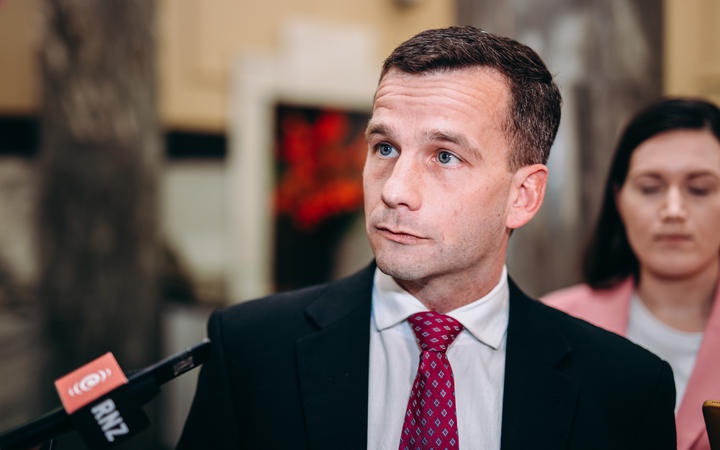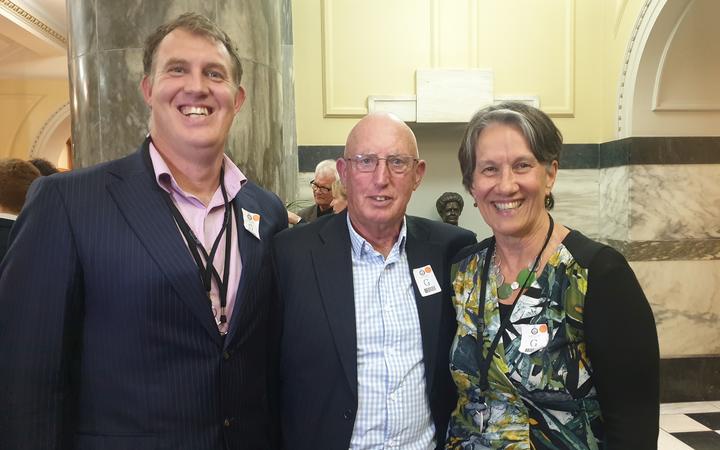Jo Moir, Political Reporter
New Zealanders now have the casting vote on whether to make euthanasia legal, after Parliament voted 69 votes to 51 in favour of the End of Life Choice Bill.

David Seymour, whose End of Life Choice Bill now depends on a referendum of the New Zealand public. Photo: RNZ /Dom Thomas
Last night Parliament voted 69 votes to 51 in favour of the End of Life Choice Bill that proposes to make assisted dying legal for some terminally ill people.
After New Zealand First secured a change three weeks ago to ensure the decision would be sent to a referendum, it will not be known whether the bill becomes law until next year.
Read
more:
• Look
back at End of Life Choice Debate in pictures and the words
of MPs
• Euthanasia
bill passes final reading

Lecretia Seales' family celebrate Parliament's vote in favour of the bill. Photo: RNZ / Charlie Dreaver
For Shirley Seales - whose daughter Lecretia Seales inspired the bill with her legal battle seeking the right to die with dignity, a battle which ended too late for her - the success of the final reading was a huge moment.

Lecretia Seales Photo: FACEBOOK
It is four years since David Seymour's member's bill was put in the ballot. Its introduction in June 2017 has been followed by sixteen months of public hearings - the longest submission period on a New Zealand bill.
Parliament voted on the bill as a conscience issue - not along party lines - and it was not smooth sailing getting to the third reading, with a large bloc opposed right the way through.
There was even a last-minute protest from hundreds of people on Parliament's forecourt just hours before the debate got under way.
Mr Seymour told Morning Report that MPs for the most part were not in favour of a referendum but voted for the bill because it was important to it passed.
"I
welcome having a fact-based discussion" - David Seymour
duration 5:02
from
Morning Report
Click a link to play audio (or right-click to
download) in either
MP3 format or in OGG format.
He said there was likely to be a great deal of public discussion about safeguards and the strict assessment criteria people would have to meet to qualify.
"One thing we know from overseas, a lot of people are ... deemed eligible ... but they never actually use it, and they actually get a great sense of empowerment simply from knowing they're in control."
Politicians react
Supporters and opponents for the bill came from both sides of the political divide.
National MP Nick Smith was one of those most vehemently opposed.
"What this bill does is it says that a person is able to take their own life without their mum, their dad, maybe their son or daughter or husband, wife or partner and have no knowledge until they read the death notice in the paper," he said.
It must be noted however that the bill includes a provision that the attending medical professional must encourage the person to discuss their wish with others, and confer with family members to ensure the person in question has made the decision free from pressure by another person.
National's Harete Hipango, also against the bill, did not mince her words.
"Let's not euphemise this with niceties and phrases - this is a kill bill."
Then there were the supporters, including some unexpected backers like Labour's Willie Jackson who repeatedly changed his stance on the bill.
He said he had gone to speak to three high-profile Māori leaders.
"They were tired of hearing this was a violation of our culture," he said. "All were unanimous that in their view tikanga evolves, tikanga changes and there is no one tikanga," he said.
Labour's Carmel Sepuloni has also been on the fence, and stressed that culture and religion were not the same when making a conscience vote.
"I had to make a decision, and I have fallen just on the line in favour. And I won't stand here and tell anyone what I think they should do because I struggled enough myself with the personal decision I had to make," she said.
The Green Party and New Zealand First chose to vote as a bloc. For the Greens, the narrowing of the bill to apply only to the terminally ill secured their vote, while a referendum at next year's election got New Zealand First across the line.
National MP Maggie Barry - who has been a major opponent of the bill - was in the lobby counting the votes for the noes and told media afterwards that it was gutting as she realised people who had pledged to oppose the bill had changed their mind.
She recently announced her retirement at next year's election and says it's now war in the lead-up to the referendum.
"The battle tonight was lost but we are involved now in a major war to tell the people of New Zealand what this bill might mean for the vulnerable, the disabled and those who are afraid for their lives," she said.
Ms Barry told Morning Report she thought "some MPs took the pass of not being responsible for their own conscience and put it to the referendum, that was the easy way out for them. So they've been getting a lot of pressure, if they can say they're putting it to the public that takes the pressure off them as individual MPs."
She said a lot of MPs who didn't like referendums voted for it just to get it through.
"Whether
you agree with euthansia in some form or other, it's this
bill and the way it delivers it without safeguards which is
what I object to" - National Party MP Maggie Barry duration
3:48
from
Morning Report
Click a link to play audio (or right-click to
download) in either
MP3 format or in OGG format.
"I think that the MPs, it is disappointing and sad they did not engage with the committee ... because that was our chance to really improve the safeguards on the bill."
Ms Barry was opposed to the bill due to its lack of safeguards.
"There's a couple of issues at play now. One of them is whether people want choice at the end of their lives. My contention has always been that this is not the bill to provide it because it is flawed, it is a member's bill, it hasn't come through with the usual rigour from the justice ministry, the health ministry...
"Whether you agree with euthansia in some form or other, it's this bill and the way it delivers it without safeguards which is what I object to."
Both Ms Barry and Mr Seymour have always maintained the debate is not personal, but neither backed away from one final word to each other.
"Look, I think Maggie Barry, it's about time for her to get back to the garden where I think she'll be very successful again," he said.
Ms Barry offered this in response.
"I haven't really talked to the sponsor of the bill about anything except death ... he doesn't matter in the scheme of things," she said.
The public will now ultimately decide the fate of Mr Seymour's bill.



 Gordon Campbell: On Wealth Taxes And Capital Flight
Gordon Campbell: On Wealth Taxes And Capital Flight Ian Powell: Why New Zealand Should Recognise Palestine
Ian Powell: Why New Zealand Should Recognise Palestine Binoy Kampmark: Squabbling Siblings - India, Pakistan And Operation Sindoor
Binoy Kampmark: Squabbling Siblings - India, Pakistan And Operation Sindoor Gordon Campbell: On Budget 2025
Gordon Campbell: On Budget 2025 Keith Rankin: Using Cuba 1962 To Explain Trump's Brinkmanship
Keith Rankin: Using Cuba 1962 To Explain Trump's Brinkmanship Binoy Kampmark: The Killing Of Israeli Embassy Staffers - Netanyahu’s Antisemitism Canard
Binoy Kampmark: The Killing Of Israeli Embassy Staffers - Netanyahu’s Antisemitism Canard